Last week, 9to5Mac discovered that the beta of iOS 14 offered the ability for consumers to leave reviews for local businesses in Apple Maps. Historically, Apple has relied on Yelp, TripAdvisor, and Foursquare for their reviews. Apple’s apparent move into the local review space created a fair bit of buzz in the Local SEO community.
I asked David Mihm & Aaron Weiche, both with a long history in the Local review space, for their thoughts about this development which I share here along with my own.
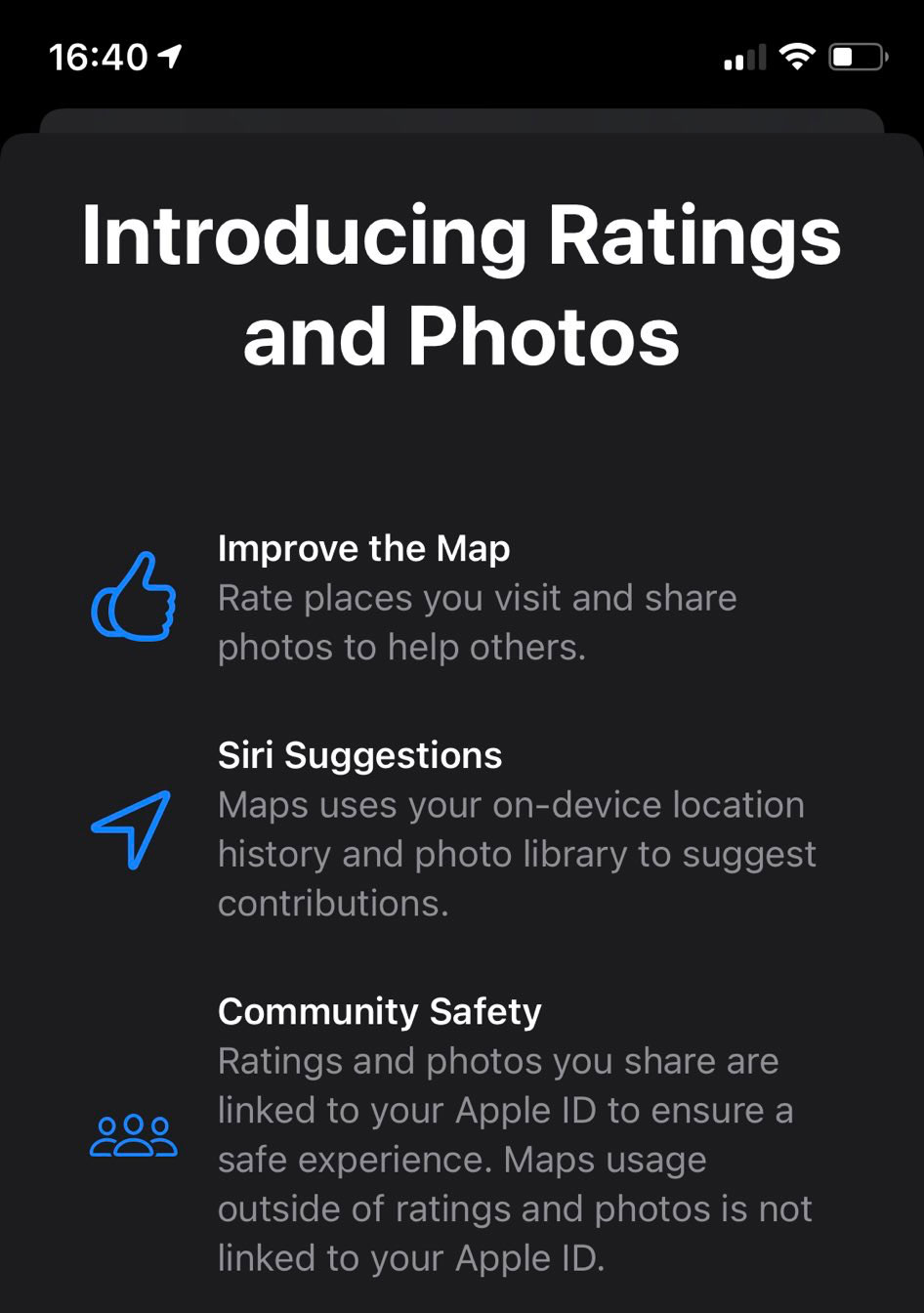
How Do Apple Reviews Work?
From 9to5: MaciOS 14 beta 6 includes new UI that lets users recommend a place with a thumbs up or thumbs down. The rating system can differentiate between categories, so users can rate the quality of purchased products in a shop highly even if they didn’t get the best service. At least at this early stage, the rating UI is only visible for a small subset of all POIs on the map.
Apparently Apple is using on-device machine learning to present POI rating opportunities when it sees that someone has visited a place several times. It appears that Apple is only accepting ratings from people that have physically visited the place.
As shown below, they are using a thumbs up or down rating system over the common 1 to 5-star rating most review sites use. This applies to both the business and services or products that they provide. While this looks to be closer to Facebook’s yes or no recommendation format it can generate a fair bit of granular data depending on the number of additional attributes reviewed.
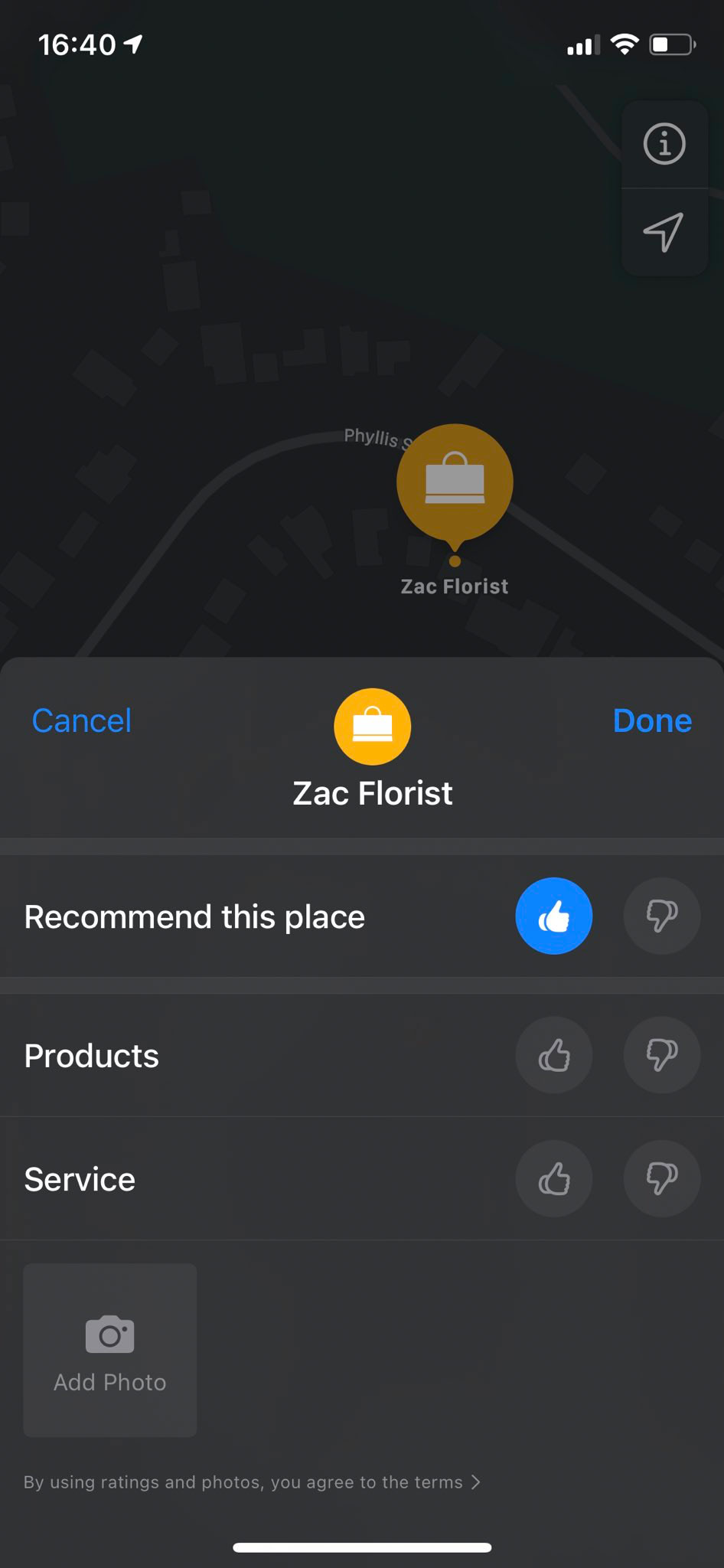
Local search expert David Mihm shared “Apple unsurprisingly understands how to get the best aggregate data from the widest range of users — asking for simple thumbs-up/thumbs-down ratings, and then asking follow-ups about specific features of the experience. It’s about as far from the Yelp model biased towards elite reviewers and long-form reviews as possible”.
Why Is Apple Getting Into The Review Space?
Apple is a world wide business with consumers in most every country and a strong desire to provide them and the developers that serve them a consistent and enjoyable user experience. Apple also does not like to be dependent on other companies to do that. Obviously Apple has been dependent on Google for search and to a lesser extent on Yelp and Trip Advisor for reviews. None of their current review partners offer a world wide scope and a reach across the many local businesses that Apple’s customers are searching for.
“The review space is very ripe for a solid #2 player. For most businesses, Google is the only review site they really care about outside of a few industry specific review sites. In addition to other motivations, Apple might feel that the move to becoming relevant here isn’t that large.” shared Aaron Weiche.
If, as the rumors indicate, Apple is looking to create its own search engine for the discovery of web content, then Local search is a critical component of that. It makes sense that Apple creates a context in which they are not dependent on or beholden to other’s needs and interests and it makes sense that they would want to control their own destiny. That is what led to their decision to build out a mapping alternative to Google Maps 8 years ago.
Also as privacy concerns increase, search is an obvious space where Apple can create a more private alternative for consumers.
And if, like me, Apple sees Local search as the MOST important aspect of search in the coming years, then that is all the more reason for them to commit to reviews.
That being said local search is hard and reviews are hard.
How Soon Will We See An Impact In The Marketplace?
Apple, despite its reputation as an innovator, typically achieves excellence and market share through steady and methodical improvements to their hardware and software. There are a number of potential stumbling blocks but if a product is important to Apple we can expect slow and steady improvements on a 6 month or annual cycle.
“Given how rough the Apple Maps rollout was, I’m not expecting perfection anytime soon. But there’s a lot of potential here, based on the limited screenshots I’ve seen of the feature” added Mihm.
I would add that it took Apple almost 4 years to get Maps to a level of minimal functionality and 6 years to get it to a fully useful and friendly product. It’s biggest current lack, compared to Google Maps, is their incomplete business listing information. Reviews are an obvious way to start remediating that difference.
What Will Businesses Get Out Of It?
Apple, unlike Google, serves only one master, the purchasers of their products. Their focus is singularly on those consumers and they are not distracted to any great degree by the needs of marketers or advertisers. Thus whatever features they do make available to their billion + users, will uniquely serve those users. Marketers can plan on largely being left out of the equation.
Beacons were a good example. Apple could have made them a universally used technology but in the end, chose users and their privacy over the desires of businesses to communicate with them.
Mihm noted that “The downside is, Apple Maps now becomes ‘one more platform’ that businesses will now need to monitor and influence their reputation. The biggest unknowns are:
“1) whether Apple will build the requisite business-oriented features to do so (Apple Maps Connect in its current form isn’t going to cut it), and
“2) if it will open up its platform to third-party solutions such as GatherUp to make engagement between businesses and customers easier.”
Hopefully though Apple will at least nod toward the business community and make this review information readily available to the business and allow them to easily respond and monitor them. But, I would note, that the features needed by businesses are unlikely to make it into the 1.0 cut.
Who knows how soon they might appear, if ever?
What About Review Spam?
Certainly spam in the review space is a big issue for all of the bigger and more generalized current players like Google, Yelp & TripAdvisor. That being said, companies like Booking.com and OpenTable that predicate the ability to leave a review based on a transaction have much less of spam problem.
Can a generalized mapping solution like Apple Maps find some middle ground between requiring a transaction and allowing just anyone to leave a review?
9to5 noted that currently the ability to leave a review if Maps actually “knows” that they have actually visited a location. While not as definitive as a purchase, it is more “proof” of a visit than either Google or Yelp require. Obviously this requirement alone could control some spam as it would be difficult for spammers to spoof location visits.
A verified digital identity is another tactic that can minimize spam. David noted in this regard: “For one, ratings and photos are linked to your Apple ID — which means Apple will have infinitely stronger spam detection than Google, right out of the gate. And on top of that, all photos will be reviewed by a human, meaning it’s unlikely we’ll see poop emojis or myriad other photo spam we’ve seen in Google over the years”.
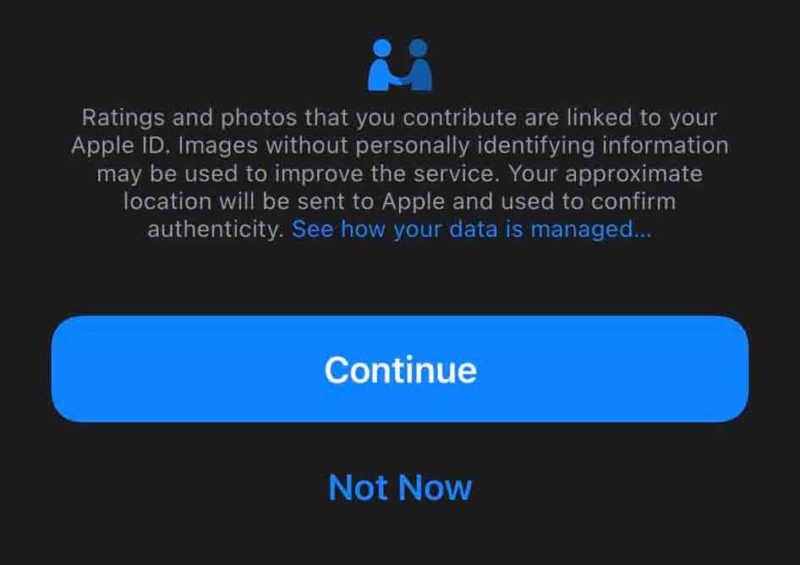
Obviously the requirement for geo proximity and your Apple ID will make spamming more difficult. Apple, for whatever their faults, pride themselves on maintaining family friendly spaces. While review spam is challenging this may be an area where they are in fact able to distinguish themselves in the marketplace.
What Impact Will This Have On Other Sites In The Review Space?
Currently, when you share a location link from Apple Maps with an Android or Windows user, Apple redirects that user to Google Maps. While a billion users is a lot, if that design persists then it limits who can read and write Apple Map reviews.
Google, given the large presence of Google Maps on the iPhone, is unlikely to be impacted too much by the move. If Apple also moves off of Google search and creates their own search engine, the impact would still only be slightly more on Google’s ability to generate reviews.
From where I sit, the biggest likely loser in this would be their current partners Yelp and TripAdvisor. And of those two, given the worldwide reach of TripAdvisor and their more vertical focus in travel and hospitality, Yelp is the more vulnerable to being impacted by this move.
Mihm noted that “this will have a significant impact on Yelp’s value for businesses. Yelp will be important as long as it continues to influence rankings in Google, but it’s lost its biggest distribution channel. Arguably the most impactful Yelp ratings appeared alongside your listing in Apple Maps.”
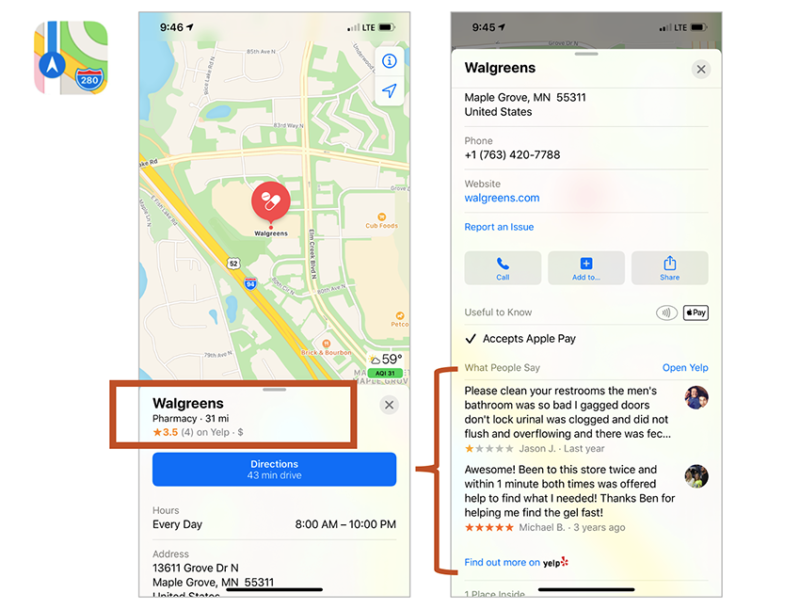
Yelp has long been on a slow steady decline in their users and Covid seems to have pushed them further into a hole and this fact is likely obvious to Apple as well.
In their recent quarterly financial filing Yelp noted that unique visitors for the last 3 months dropped by roughly 37% over last year across all of their surfaces (app, mobile web, desktop). It is unclear how Yelp counts reviews read at 3rd party sites like Apple and Bing, but the loss of Apple readers would be significant.
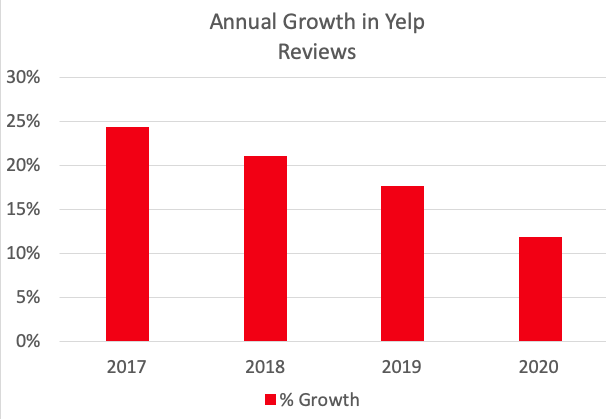
However equally significant is that their review growth has also slowed significantly over the past few years. While this past quarter was particularly hard hit, the drop in growth of the number of reviews has been on-going for a number of years. Apple Maps has to be sending some reviewers in Yelp’s direction and that is likely to further suppress their growth in reviews. Given the need for recency in review content, this does not look good for Yelp.
The Bottom Line
Weiche summarized his thoughts with “This move caused me to ask myself if we need another review source for consumers, and I feel that answer is yes. What I’m interested to see is if Apple can build off of the pros and cons from other review sites and be a trusted, quality resource of reviews and customer experiences. I think businesses and consumers alike would flock to that.”
While it is likely that Apple getting into local reviews will have an immediate impact on consumers, businesses, and others in the review space, the impact will take time to be visible and its full import may take years to be determined.

Comments are closed.